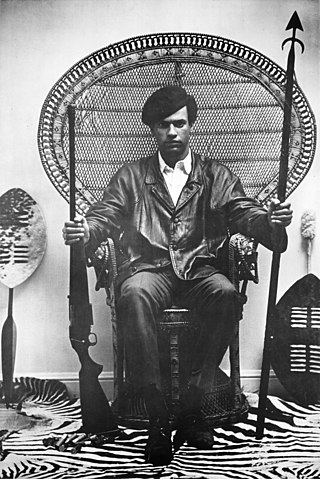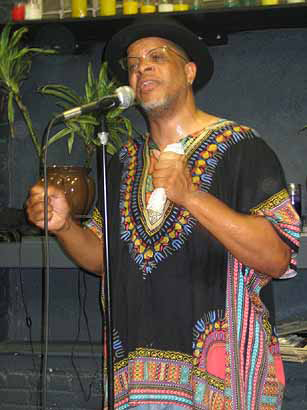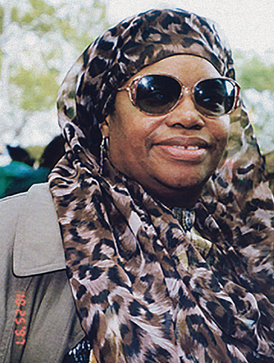Related Research Articles

Robert George Seale is an American engineer, political activist and author. Seale is widely known for co-founding the Black Panther Party with fellow activist Huey P. Newton. Founded as the "Black Panther Party for Self-Defense", the Party's main practice was monitoring police activities and challenging police brutality in Black communities, first in Oakland, California, and later in cities throughout the United States.

Huey Percy Newton was an African-American revolutionary and political activist. Newton was most notable for being a co-founder of the Black Panther Party where he operated the organization as the de facto leader. Newton crafted the Party's ten-point manifesto with Bobby Seale in 1966.

The prison abolition movement is a network of groups and activists that seek to reduce or eliminate prisons and the prison system, and replace them with systems of rehabilitation that do not place a focus on punishment and government institutionalization. The prison abolitionist movement is distinct from conventional prison reform, which is the attempt to improve conditions inside prisons.

Ashanti Omowali Alston is an anarchist activist, speaker, writer, and former member of the Black Panther Party and Black Liberation Army. From 1974 to 1985, he spent time in prison for bank robbery, which caused him to become further engaged in politics. He is currently on the Steering Committee of the Jericho Movement to free what they refer to as “political prisoners” in the US. Alston resides in Providence, Rhode Island.

The Black Power movement was a branch or counterculture within the civil rights movement of the United States, reacting against its more moderate, mainstream, or incremental tendencies and motivated by a desire for safety and self-sufficiency that was not available inside redlined African American neighborhoods. Black Power activists founded black-owned bookstores, food cooperatives, farms, media, printing presses, schools, clinics and ambulance services. The international impact of the movement includes the Black Power Revolution in Trinidad and Tobago.
Tihar Prisons, also called Tihar Jail and Tihar Ashram, is a prison complex in India and the largest complex of prisons in South Asia. Run by Department of Delhi Prisons, Government of Delhi, the prison contains nine central prisons, and is one of the three prison complexes in Delhi. The other two prison complexes are at Rohini and Mandoli with one and six central prisons respectively. Tihar prison complex is located in Janakpuri, approximately 3 km from Tihar village in West Delhi.

Kuwasi Balagoon, born Donald Weems, was an American political activist, anarchist and member of the Black Panther Party and Black Liberation Army. Radicalised by race riots in his home state of Maryland growing up, as well as by his experiences while serving in the US Army, Weems became the black nationalist known as Kuwasi Balagoon in New York City in the late 1960s. First becoming involved in local Afrocentric organisations in Harlem, Balagoon would move on to become involved in the New York chapter of the Black Panther Party, which quickly saw him charged and arrested for criminal behaviour. Balagoon was initially part of the Panther 21 case, in which 21 panthers were accused of planning to bomb several locations in New York City, but although the Panther 21 were later acquitted, Balagoon's case was separated off and he was convicted of a New Jersey bank robbery.

Kathleen Neal Cleaver is an American law professor and activist, known for her involvement with the Black Power movement and the Black Panther Party, a political and revolutionary.
Dhoruba al-Mujahid bin Wahad is an American writer and activist, Black Panther Party leader and co-founder of the Black Liberation Army. Dhoruba, in Swahili, means "the storm".
The Ten-Point Program or The Black Panther Party for Self-Defense Ten-Point Platform and Program is a party platform written by Huey P. Newton and Bobby Seale in 1966 for the Black Panther Party.

The Black Panther Party (BPP), originally the Black Panther Party for Self-Defense, was a Marxist-Leninist and black power political organization founded by college students Bobby Seale and Huey P. Newton in October 1966 in Oakland, California. The party was active in the United States between 1966 and 1982, with chapters in many major American cities, including San Francisco, New York, Chicago, Los Angeles, Seattle, and Philadelphia. They were also active in many prisons and had international chapters in the United Kingdom and Algeria. Upon its inception, the party's core practice was its open carry patrols ("copwatching") designed to challenge the excessive force and misconduct of the Oakland Police Department. From 1969 onward, the party created social programs, including the Free Breakfast for Children Programs, education programs, and community health clinics. The Black Panther Party advocated for class struggle, claiming to represent the proletarian vanguard.
Marshall "Eddie" Conway was an American black nationalist who was a leading member of the Baltimore chapter of the Black Panther Party. He was convicted in 1971 for the murder of a police officer a year earlier in a trial with many irregularities. In 2014 he was released on parole after an appellate court ruled that his jury had been given improper instructions.
Kouhyar Goudarzi is an Iranian human rights activist, journalist and blogger who was imprisoned several times by the government of Iran. He previously served as an editor of Radio Zamane. He is a member of Committee of Human Rights Reporters (CHRR), serving as the head from 2005-2009.
People's Law Office (PLO) is a law office in Chicago, Illinois, which focuses on public interest law, representing clients believed to have been the subject of attacks by governmental officials and agencies. It was founded in 1969. Clients have included political activists, people who have been wrongfully arrested and imprisoned, or subjected to excessive force; and criminal defendants.

Mark Everett Comfort was a community activist who worked in early Oakland grassroots civil rights movements in the 1960s, before moving to Lowndes County, Alabama.

The Anarchist Black Cross (ABC), formerly the Anarchist Red Cross, is an anarchist support organization. The group is notable for its efforts at providing prisoners with political literature, but it also organizes material and legal support for class struggle prisoners worldwide. It commonly contrasts itself with Amnesty International, which is concerned mainly with prisoners of conscience and refuses to defend those accused of encouraging violence. The ABC openly supports those who have committed illegal activity in furtherance of revolutionary aims that anarchists accept as legitimate.

Elbert Howard, better known as Big Man, was an American civil rights activist and author who was one of the founding members of the Black Panther Party.
All Power to the People: Black Panthers at 50 was an exhibition hosted by the Oakland Museum of California (OMCA) from October 8, 2016, to February 26, 2017. The exhibit was organized by OMCA's senior curator René De Guzman.

Safiya Bukhari was an American member of the Black Panther Party. She was also the co-founder of the Free Mumia Abu-Jamal Coalition (NYC), the Jericho Movement for U.S. Political Prisoners and Prisoners of War, and was the vice president of the Republic of New Afrika.

Stanislaus Lourduswamy, SJ, popularly known as Stan Swamy, was an Indian Catholic priest, a member of the Jesuit order, and a tribal rights activist for several decades. Swamy was the oldest person to be accused of terrorism in India.
References
- ↑ Civil Disobedience Training, ACT-UP
- ↑ McIntyre, Iain (2022-07-15). "Jail Solidarity and Supporting Prisoners". The Commons Social Change Library. Retrieved 2022-08-04.
- ↑ National Lawyers Guild, LA Chapter, Questions and Answers about Civil Disobedience and the Legal Process (PDF), archived from the original (PDF) on 2011-07-27
- ↑ Mirelle Cohen (Oct 2007), vol. 35, Teaching Sociology, pp. 391–392
{{citation}}: Missing or empty|title=(help) - ↑ Organizing Support and Solidarity for Arrestees, archived from the original on 2010-09-26, retrieved 2010-07-18
- ↑ VE Sopher (1983), Mass Civil Disobedience: A Lawyer's Perspective, Guild Prac.
- ↑ W Pasley, Brown Social Justice Activist Group Sustainability: An Ethnographic Inquiry (PDF), ISA Ethnography, archived from the original (PDF) on 2011-07-24, retrieved 2010-07-18
- ↑ Hiken, Louis; Hiken, Marti (1995), Imprisonment - America's Drug of Choice, vol. 52, Guild Prac., p. 65
- ↑ P Herngren (1993), Path of Resistance (PDF), The Practice of Civil Disobedience, archived from the original (PDF) on 2011-07-28
- ↑ "prisonersolidarity.org".
- ↑ "Jail Accountability and Information Line (JAIL) | CPEP" . Retrieved 2023-03-14.
- ↑ The Dr Huey P. Newton Foundation, The Black Panther Party: Service to the People Programs (Albuquerque: University of New Mexico Press, 2008), p. 78
- ↑ The Dr Huey P. Newton Foundation, The Black Panther Party: Service to the People Programs (Albuquerque: University of New Mexico Press, 2008), p. 79